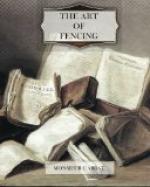CHAP. XXIX.
Of the Necessity of some Qualities in a Master.
In order to teach well, it’s necessary to have a perfect Idea of the Means which conduce from the Beginning to the End of the Matter proposed, I mean to it’s Perfection, or to what comes nearest it, if our Age has not as yet arrived to it.
In Fencing, as well as in other Exercises, there should be Judgment and Knowledge how to act and how to Teach: The first is the Effect of a long and good Theory; the second, of a good Theory, long Practice, and a good Disposition; and the third, besides the Theory and Practice, is the Effect of a good Genius, or of a particular Talent.
Qualities which shou’d be always united; so that the Genius may be capable of teaching properly to different Persons, the Application of the Rules which are acquired by Experience.
It is as necessary in this Art that a Master’s Motions shou’d be regular, and that he shou’d hold the Foil properly in his Hand, as it is for a Writing Master to draw the Example well that he would have copied; so that the Scholar of the one, or of the other, may learn a better Motion, or a finer Character. It is also proper that when a Scholar commits a Fault, the Master shou’d shame him by imitating it, the seeing the Fault making a greater Impression than the hearing of it.
A Master in his Lesson shou’d give a Time to the Scholar to make him push, in order to teach him to take the Enemy’s Time. He shou’d likewise sometimes beat back his Body, and parry him from time to time, that he may accustom him to be firm on his Legs, to oppose his Sword well, and to recover well: It is good sometimes to let him make several Thrusts following, and then remaining firm all of a sudden, to shew him, that he shou’d always be ready to thrust when an Opportunity offers, and to retain himself when it does not offer.
In order to make him take the Time well, and to form his Parade and Rispost properly, the Time that the Master gives must have a Regard to Rule, and sometimes to the Disorder of an unskilful Enemy, that he may be equally fortifyed for both; and to form his Parade and Rispost the Master must push in the Manner the most like to an Assault.
Though most Masters give Lessons with shorter and stiffer Foils than are used in assaulting or playing loose, I esteem it better always to use the same Foils that they may not be deceived in an Assault.
A Master’s Play shou’d be neat, subtle agreeable, and useful, as fit for Combat as for the School.
The Art of Fencing being to make the most of a good or bad Disposition, when ’tis good ’tis capable of being made perfectly dexterous, and when bad, the Defect of Nature is to be repaired by Art.
By saying that ’tis no hard Matter to perfect such Men as are naturally of a very good Disposition, is meant the bringing them to a certain Point which they could almost arrive to of themselves, by Practice and Speculation; but it is well known that it is the Business of a good Master to make his Scholar perfectly dexterous, and tho’ he may have a good Disposition and long Exercise, if he is not well instructed, he cannot become dexterous, even tho’ he shou’d execute with Agility, being incapable of acquiring a Good without knowing and practising it.




